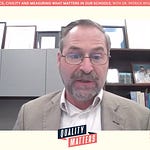Last week Bill Gates announced that the Gates Foundation will close its doors in 2045, earlier than was previously planned, and will give away nearly all of its assets during the remaining 20 years. This announcement had development professionals everywhere salivating but the more important question to me is: how will the Gates Foundation’s leaders determine which causes, initiatives, and projects to support?
If you’re the daydreaming type you may wonder what you would do with that kind of wealth. I had the opportunity to sit down with someone for whom this is not just a hypothetical scenario. Katie Everett, the Executive Director of the Lynch Foundation (a philanthropic organization that predates Gates by more than a decade), is charged with considering how to give away millions of dollars each year in a way that encourages people achieve their fullest potential.
Most of us will never sit atop a foundation with hundreds of millions of dollars, deciding which bold new idea gets the green light. But after speaking with Katie, I’m convinced that her lessons are relevant for the masses. For instance, during our conversation she highlights:
Local context over scale - there is a lot of talk among American foundations and businesses about how quickly results can be scaled at state and national levels, but if we leapfrog the deep understanding that comes with local proximity you can be sure that mistakes will be made.
Honest power dynamics - Katie is clear-eyed about the inherent power imbalance between funders and grantees and stresses the importance of transparency, mutual respect, and truth-telling.
All to say, Katie’s been doing this work for nearly three decades and she’s seen trends, buzzwords, and silver-bullet solutions come and go. But what hasn’t changed is the Lynch Foundation’s clarity of mission, and its ruthless commitment to proximity. Her team gets in the weeds with doers, not grifters and clout-chasers.
Katie told us, “I’m not here to make friends.” That’s not arrogance. That’s focus. That’s a lesson for school boards, district leaders, and nonprofits alike: know what you're about. And maybe more importantly—know what you’re not about. At a time when education policy can feel like a long-winded group project, I find that kind of clarity refreshing.
I hope you’ll watch the full Quality Matters episode because there are too many great takeaways to cover in this note.












Share this post